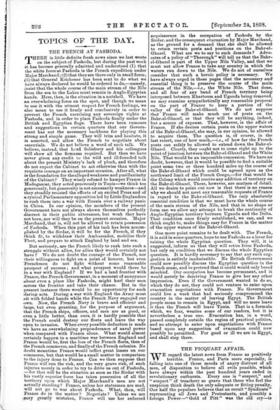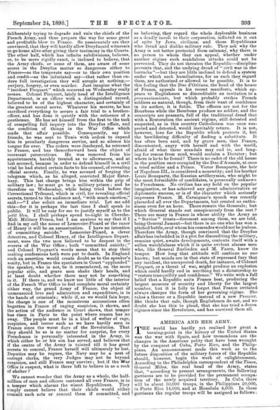THE PICQUART AFFAIR.
WE regard the latest news from France as positively terrible. France, and Paris more especially, is falling into one of those moods of angry distrust of all men, of disposition to believe all evils possible, which have always within the past hundred years ended in revolutionary outbursts. Every one is "suspect," and " suspect " of treachery so grave that those who feel the suspicion think death the only adequate or fitting penalty. One half the populace believes that an occult " Syndicate" representing all Jews and Protestants, and possibly a foreign Power—" Gold of Pitt" was the old cry—is deliberately trying to degrade and ruin the chiefs of the French Army, and thus prepare the way for some great and profitable blow to France. So passionately are they convinced, that they will hardly allow Dreyfusard witnesses to go home alive after giving their testimony in the Courts. The other half, which has infinite subdivisions, believes, or, to be more rigidly exact, is inclined to believe, that the Army chiefs, or some of them, are aware of some secret in the Dreyfus matter so dangerous either to France—as the temperate say—or to their own position and credit—as the infuriated say—that rather than en- dure full investigation they will scruple at nothing,— perjury, forgery, or even murder. Just imagine what the "incident Picquart" which occurred on Wednesday really means. Colonel Picquart, lately head of the Intelligence Department, is an officer with a distinguished record, believed to be of the highest character, and certainly of the greatest moral nerve. Whatever his motive, he has sacrificed everything to secure a fair trial to a brother- officer, and has done it quietly with the reticence of a gentleman. He has set himself from the first to the task of compelling full inquiry into the Dreyfus affair, and the condition of things in the War Office which made that affair possible. Consequently, say his friends, he was sent to Tunis with orders to expend him in peculiarly dangerous service, and so silence his tongue for ever. The orders were disobeyed, he returned to France, and has thenceforward been the object of incessant persecutions. He was removed from his appointments, harshly treated as to allowances, and at last accused, because in order to defend himself in a civil trial he had stated certain facts to his counsel, of revealing official secrets. Finally, he was accused of forging the telegram which, as he alleged, convicted Major Ester- hazy. This last charge brings him within the grip of military law ; he must go to a military prison ; and he therefore on Wednesday, while being tried before the Correctional Tribunal, which is civil, for revealing official secrets, turned to the audience and, "with much emotion," said :—" I also solicit an immediate trial. Let me add this—for it is perhaps the last time I shall speak in public. It will be easy for me to justify myself as to the petit bleu. I shall perhaps spend to-night in Cherche- Midi Military Prison, but I am anxious to say that if I find in my cell the noose of Lemercier-Picard or the razor of Henry it will be an assassination. I have no intention of committing suicide." Lemercier-Picard, a clever detective, and Colonel Henry, of the Intelligence Depart- ment, were the two men believed to be deepest in the secrets of the War Office ; both "committed suicide ; " and Colonel Picquart's words mean that to stop their making confessions both were put to death. In England such an assertion would create doubt as to the speaker's sanity, but in France the spectators in Court "applauded" the speaker, who is not, be it remembered, on the more popular side, and grave men shake their heads, and at least doubt whether there may not be something in it. If there is, and we know too little of the interior of the French War Office to feel complete moral certainty either way, the grand Army of France, the object of unmeasured love and admiration and expenditure, is in the hands of criminals ; while if, as we would fain hope, the charge is one of the monstrous accusations often begotten in France of raging suspicion, it shows, and the action of the audience in Court shows, that temper has risen in Paris to the point where reason has no sway. The people must be in a kind of welter of rage, suspicion, and terror such as we have hardly seen in France since the worst days of the Revolution. That they should be so is no matter for surprise, for every Frenchman is personally interested in the Army, in which either he or his son has served, and believes that if the centre of the Army is tainted till it has great secrets to conceal, France herself will ultimately be lost. Deputies may be rogues, the Navy may be a nest of corrupt clerks, the very Judges may not be beyond suspicion, and still France may survive ; but if the War Office is suspect, what is there left to believe in as a rock of shelter ?
We cannot wonder that the Army as a whole, the half. million of men and officers cantoned all over France, is in a temper which alarms the wisest Republicans. They simply cannot believe that their chiefs would either commit such acts or conceal them if committed, and so believing, they regard the whole deplorable business as a deadly insult to their corporation, inflicted on it out of spite by Jews, civilians, and those Republicans who dread and dislike military rule. They ask why the Army is not better protected from calumny, why there is no person to whom they can appeal, whether under another regime such scandalous attacks could not be prevented. They do not threaten the Republic—discipline prevents that, and the undying dread of "civil war in the barracks "—but they are little inclined to defend a system under which such humiliations, for as such they regard them, are authorised or allowed to be possible. It is to this feeling that the Due d'Orleans, the head of the house of France, appeals in his recent manifesto, which ap- pears to Englishmen so discreditable an invitation to a pronunciamiento, but which probably strikes French soldiers as natural, though, from their want of confidence in its author, it is futile. The officers are not for the Bourbons while the Bourbons produce no soldier, and the conscripts are peasants, full of the traditional dread that with a Restoration the ancient regime, still detested and suspected, as in this country Catholicism was once sus- pected and detested, would inevitably return. It is not, however, love for the Republic which protects it, but the bewildering difficulty of finding a substitute. It has often been said, and by grave men, that France, discontented, angry with herself and with the world, afraid of what these scandals may end in, and long- log for rescue from mud, would acclaim a Dictator; but where is he to be found? There is no cadet of the old house in the position once occupied by the Duc d'Aumale, at once a tried soldier and a Prince. Victor Bonaparte, the heir of Napoleon III., is considered a nonentity; and his brother Louis Bonaparte, the Russian artilleryman, who might be the most formidable of candidates, is personally unknown to Frenchmen. No civilian has any hold on the popular imagination, or has achieved any great administrative or diplomatic success, or is of the character which seriously impresses France. M. Cavaignac's speech was recently placarded all over the Departments, but created no enthu- siasm even for an hour. There remain the Generals; but which General stands out conspicuously from the rest ? There are many in France in whose ability the Army as- a" Service" trusts—foremost among them, we are told, being General Jamont—but there is no one who has won a pitched battle, or of whom his comrades would not be jealous.. Therefore the Army, though convinced that the Dreyfus affairhas imbedded in it a plot for discrediting the military, remains quiet, awaits developments, contents itself with a. sullen watchfulness which it is quite evident alarms men who, like General Zurlinden and M. Faure, know its. temper. How long that attitude will continue no one knows; but minds are in that state of repressed fury that any incident, the unexpected death, for instance, of Colonel Picquart, or a threat of war, might produce an explosion. which could hardly end in anything but a dictatorship to "restore tranquillity and confidence." We write with a full belief that a Republic suits France best, producing the largest measure of security and liberty for the largest number, but it is folly to forget that France irritated always changes the form of her governing regime. She takes a throne or a Republic instead of a new Premier. She thinks that safe, though Englishmen do not, and no doubt she has this to plead, that she has tried a dozen regimes since the Revolution, and has survived them all.







































 Previous page
Previous page